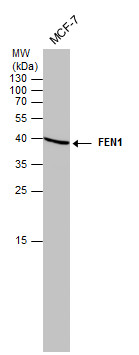Anti-Fen-1 Antibody (56208)
Anti-Fen-1 Antibody (56208)
Product No.: 56208
- -
- -
Clone 4.00E+07 Target Fen-1 Formats AvailableView All Product Type Monoclonal Alternate Names FEN-1, EC 3.1.-.-, DNase IV, Flap structure-specific endonuclease 1, Maturation factor 1, MF1, hFEN-1 Isotype Mouse IgG1 Applications ICC , IF , IP , WB |
Data
- -
- -
Antibody DetailsProduct DetailsReactive Species Human Host Species Mouse Immunogen Recombinant human FEN-1 protein (aa 1-380) purified from baculovirus-infected Sf-9 cells. Product Concentration Lot Specific Formulation 10 mM PBS, pH 7.4. State of Matter Liquid Product Preparation Purified by immunoaffinity chromatography Storage and Handling This antibody is stable for at least one (1) year at -20°C. Avoid multiple freeze- thaw cycles. Regulatory Status Research Use Only Country of Origin USA Shipping Next Day 2-8°C Applications and Recommended Usage? Quality Tested by Leinco Immunoblotting: use at 1-5 ug/mL.
Positive controls: MCF-7 cells and recombinant fusion protein. Each investigator should determine their own optimal working dilution for specific applications. See directions on lot specific datasheets, as information may periodically change. DescriptionDescriptionSpecificity This antibody recognizes human FEN-1. Background FEN-1 (Flap Endonuclease and Five Prime Exonuclease) is a 42 kD protein that functions as an endonuclease that cleaves branched DNA structures containing single-stranded 5' flaps or as an exonuclease on DNA nicks and gaps. FEN-1 endonuclease and exonuclease activities are stimulated by an association with proliferating cell nuclear antigen (PCNA) in the nucleus. FEN-1 appears to have important roles in DNA replication and repair and is required in cell-fre DNA replication systems. Function Structure-specific nuclease with 5'-flap endonuclease and 5'-3' exonuclease activities involved in DNA replication and repair. During DNA replication, cleaves the 5'-overhanging flap structure that is generated by displacement synthesis when DNA polymerase encounters the 5'-end of a downstream Okazaki fragment. It enters the flap from the 5'-end and then tracks to cleave the flap base, leaving a nick for ligation. Also involved in the long patch base excision repair (LP-BER) pathway, by cleaving within the apurinic/apyrimidinic (AP) site-terminated flap. Acts as a genome stabilization factor that prevents flaps from equilibrating into structures that lead to duplications and deletions. Also possesses 5'-3' exonuclease activity on nicked or gapped double-stranded DNA, and exhibits RNase H activity. Also involved in replication and repair of rDNA and in repairing mitochondrial DNA. {HAMAP-Rule:MF_03140, PubMed:10744741, PubMed:11986308, PubMed:18443037, PubMed:20729856, PubMed:26751069, PubMed:7961795, PubMed:8621570}. NCBI Gene Bank ID UniProt.org Research Area Neuroscience References & CitationsTechnical ProtocolsCertificate of Analysis |



 antibody at 1:200 dilution.](https://www.leinco.com/wp-content/uploads/2025/01/qed-bioscience-anti-fen-1-antibody-56208-2.jpg)
